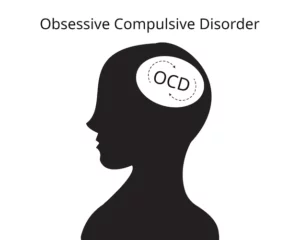If you have OCD, you may be wondering if antipsychotic medication is a good treatment option for you. This type of medication is effective in reducing the symptoms of OCD in some people. However, it is important to understand the risks and benefits associated with antipsychotic medications before deciding whether or not to take them. In this blog post, we will discuss the use of antipsychotics for OCD and provide some information on what you need to know before starting treatment.
Contents
What Is OCD?

OCD is a mental health disorder characterized by intrusive thoughts, worries, and behaviors that cause distress. People with OCD often have difficulty controlling their unwanted thoughts and compulsions. They may attempt to manage them through rituals such as counting or handwashing, but the condition can be severely disruptive to daily life.
The signs of OCD can vary from person to person and may include: Obsessive thoughts or fears; Compulsive rituals; Avoidance of certain situations or objects; Anxiety when rituals are not performed.
The reasons for OCD are not fully understood, but research suggests that it is a combination of biological, psychological, and environmental factors. Treatment usually consists of cognitive behavioral therapy (CBT), medication, and other lifestyle changes.
What Are Antipsychotics?
Antipsychotics are medications used to treat symptoms of mental health disorders such as psychosis, schizophrenia, bipolar disorder, and major depression. These drugs work by blocking receptors in the brain that regulate serotonin (the neurotransmitter involved in mood regulation) and dopamine (the neurotransmitter involved in motivation).
Antipsychotics can also be used to treat OCD—in particular, they have been found to reduce obsessive thoughts and compulsions related to OCD. They are usually prescribed alongside other treatments such as cognitive behavioral therapy (CBT) and therapy.
Types of Antipsychotics For OCD

There are many types of antipsychotic medications available to treat OCD. Some of the most commonly prescribed include risperidone (Risperdal), olanzapine (Zyprexa), quetiapine (Seroquel), aripiprazole (Abilify), and haloperidol (Haldol). Each of these comes with its side effects, so it is important to discuss this with your doctor before taking any of them.
Risperidone (Risperdal)
One of the most commonly prescribed antipsychotics for OCD, risperidone works by blocking certain receptors in the brain that are responsible for controlling certain types of behaviors. It can help reduce obsessive thoughts and rituals, as well as improve mood.
Olanzapine (Zyprexa)
Another popular choice to treat OCD is olanzapine. It works similarly to risperidone in that it blocks particular receptors in the brain, however, its effects may be stronger than those of risperidone. Olanzapine can help to reduce anxiety and improve mood, but it also carries a higher risk of side effects such as weight gain and drowsiness.
Quetiapine (Seroquel)
Quetiapine is a newer type of antipsychotic that is sometimes prescribed to help treat OCD. It helps by blocking particular receptors in the brain and can help reduce anxiety, improve mood, and reduce obsessive thoughts and rituals.
Aripiprazole (Abilify)
Aripiprazole is another option for treating OCD symptoms. This medication works by blocking certain receptors in the brain, which can help reduce anxiety and obsessive thoughts. However, it may also carry a risk of side effects such as weight gain or drowsiness.
Haloperidol (Haldol)
Finally, Haloperidol is an older antipsychotic used to treat OCD that has been around since the 1950s. While it is generally considered to be less effective than newer medications, it may still be used in certain cases. It works by blocking particular receptors in the brain and can help reduce obsessive thoughts and rituals, as well as improve mood.
It is important to note that none of these medications are a cure for OCD, but rather they can help manage symptoms. Additionally, some people may find that one type of antipsychotic works better for them than others.
Working of Antipsychotics for OCD
The working of antipsychotics used to treat OCD is still a topic of debate among psychiatrists and doctors. While some believe in the effectiveness of these medications, others are skeptical.
- In general, antipsychotic drugs work by blocking certain receptors in the brain which disrupts the chemical balance that leads to OCD symptoms such as anxiety and obsessive-compulsive behavior. It’s thought that when these receptors are blocked, it allows more serotonin to be released into the brain — something that naturally helps regulate moods and can reduce the distress associated with OCD.
- Throughout the working of antipsychotic drugs, some potential side effects need to be considered before starting a medication regimen. These can include weight gain, sexual dysfunction, blurred vision, and involuntary movements of the face or body.
- In addition to looking at the side effects of these medications, it’s also important to evaluate how well a person is responding to them. While some may experience immediate relief from their symptoms, others may not notice any changes for several weeks or even months. Some people may require multiple medications — both psychiatric and medical — to find an effective balance that works best for them.
What Are the Pros of Taking Antipsychotics for OCD?

The biggest benefit of taking antipsychotics for OCD is that they can help reduce symptoms such as obsessive thoughts and compulsions.
Some of these benefits may include:
Reduced anxiety and stress levels
One of the most common benefits of taking antipsychotics for OCD is that they can help reduce anxiety and stress levels. This is because these medications are designed to control the dopamine levels in the brain, which helps regulate emotions such as fear and anxiety.
Improved quality of life
Taking antipsychotics for OCD may also improve a person’s overall quality of life by helping them manage their symptoms more effectively. They can help reduce intrusive thoughts, compulsive behaviors, and other symptoms associated with OCD. This could lead to improved relationships with family members, friends, colleagues, or people in general.
Reduced depression
Antipsychotics may also help reduce depressive symptoms associated with OCD by helping balance the serotonin levels in the brain. Serotonin is a neurotransmitter responsible for regulating mood, and having too little serotonin can lead to depression. By taking antipsychotics, people may be able to reduce their depressive symptoms.
Overall, taking antipsychotics for OCD can offer many benefits as long as they are taken under the supervision of a doctor. They should not be taken without consulting with a medical professional first, as the potential side effects may outweigh the possible benefits.
What Are the Cons of Taking Antipsychotics for OCD?

Although antipsychotics may provide some benefits, they can also come with side effects that need to be monitored carefully. The most common side effects include :
Drowsiness
One of the more common side effects associated with antipsychotic use is drowsiness. This could be caused by the medications depressing the central nervous system and causing fatigue.
Weight Gain
Some people have reported gaining weight while taking antipsychotics, although this has not been seen in every case. Weight gain can lead to other health problems, so it should be monitored carefully.
Blurred Vision
Another possible side effect of antipsychotics for OCD is blurred vision. Blurry or double vision can make it difficult to perform daily tasks, so anyone experiencing this should seek medical advice immediately.
Apathy and Loss of Interest
Some people have experienced an apathetic attitude and a lack of interest in activities after taking antipsychotics for OCD. This could be due to the drugs altering the brain’s chemicals, leading to an overall sense of apathy or depression.
Sexual Dysfunction
In some cases, antipsychotics can cause sexual dysfunction in people taking them for OCD. This could include difficulty achieving an erection or difficulty reaching an orgasm. It is important to talk to your doctor if you experience any sexual side effects while taking antipsychotics.
It’s also important to remember that every person may react differently when taking medications, so it’s best to discuss any concerns with your doctor before starting a new medication regimen. With careful monitoring and attention, antipsychotics can be beneficial for managing OCD symptoms in some patients.
Are There Any Alternatives to Antipsychotics for OCD?
The answer is yes. While antipsychotics are one of the most commonly prescribed treatments for OCD, many other alternatives can help manage this condition. Some of these include cognitive behavioral therapy, exposure and response prevention therapy, mindfulness-based techniques, family therapy, and self-help strategies. It is important to find the right combination of therapies to achieve the best results in managing OCD. Additionally, it is important to note that medication should be used as a supplement to other forms of treatment rather than a primary form of treatment.
In addition to traditional treatments like psychotherapy and medications, some people have found success with complementary and alternative medicine (CAM) approaches such as yoga, acupuncture, and herbal supplements. The effectiveness of CAM largely depends on the individual, so it is important to discuss all treatment options with a medical professional before making any decision.
It is also important for individuals with OCD to be aware of their triggers and develop techniques for managing them. This includes identifying stressful situations and developing coping strategies, such as deep breathing or positive affirmations. Additionally, having a support system in place can provide additional comfort during difficult times.
Conclusion
OCD is a difficult disorder to manage and treatment needs to be tailored to the person. Antipsychotics can be used as an adjunct therapy for OCD in some cases, but it is important to speak with a doctor before beginning any new treatment regimen. When considering using antipsychotics for OCD, it is important to weigh the risks and benefits of taking this type of medication.
Ultimately, finding the right combination of treatments that works best for you will help you manage your symptoms most effectively. It is important to reach out to a healthcare professional if you feel overwhelmed by your OCD symptoms and are looking for more guidance on how to best manage this condition.
For more information and guidance, please contact OCDMantra. OCD is a mental health disorder characterized by obsessions and compulsions. If you have any queries regarding OCD treatment, ERP therapy experienced therapists at OCDMantra can help: Book a trial OD therapy session.


